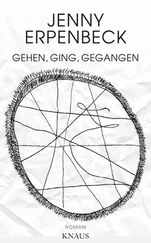Jenny Erpenbeck - The End of Days
Здесь есть возможность читать онлайн «Jenny Erpenbeck - The End of Days» весь текст электронной книги совершенно бесплатно (целиком полную версию без сокращений). В некоторых случаях можно слушать аудио, скачать через торрент в формате fb2 и присутствует краткое содержание. Год выпуска: 2014, Издательство: New Directions Publishing, Жанр: Современная проза, на английском языке. Описание произведения, (предисловие) а так же отзывы посетителей доступны на портале библиотеки ЛибКат.
- Название:The End of Days
- Автор:
- Издательство:New Directions Publishing
- Жанр:
- Год:2014
- ISBN:нет данных
- Рейтинг книги:4 / 5. Голосов: 1
-
Избранное:Добавить в избранное
- Отзывы:
-
Ваша оценка:
- 80
- 1
- 2
- 3
- 4
- 5
The End of Days: краткое содержание, описание и аннотация
Предлагаем к чтению аннотацию, описание, краткое содержание или предисловие (зависит от того, что написал сам автор книги «The End of Days»). Если вы не нашли необходимую информацию о книге — напишите в комментариях, мы постараемся отыскать её.
The End of Days — читать онлайн бесплатно полную книгу (весь текст) целиком
Ниже представлен текст книги, разбитый по страницам. Система сохранения места последней прочитанной страницы, позволяет с удобством читать онлайн бесплатно книгу «The End of Days», без необходимости каждый раз заново искать на чём Вы остановились. Поставьте закладку, и сможете в любой момент перейти на страницу, на которой закончили чтение.
Интервал:
Закладка:
She, too, had been acquainted with A., the latter-day so-called Trotskyite, ever since the first time she participated in a meeting of the Communist cell Vienna-Margareten , and she’d run into him a few times after his expulsion from the Party in 1926, the last time in Prague, shortly before she left for Moscow. This portly comrade had come late to a meeting of Austrian emigrants and had taken the last remaining empty chair, right next to hers, then he had spent the entire evening silently smoking, only once addressing her in a low voice, asking what had become of their mutual friend G. G. had recently been sent to Berlin, she’d replied, that’s all she knew. I understand, the so-called Trotskyite had responded. The smoke of his cigarette had hovered above him, motionless and thick, and for a moment the smell reminded her of J., the poet who’d gone underground. When they were all saying their goodbyes outside afterward, she had impulsively hugged A., whom no one else was deigning to so much as shake hands with, but it seemed to her that he returned the hug more out of exhaustion than friendship.
I committed a serious error in November 1934. In Prague I participated in a meeting of Austrian Schutzbund supporters at which the Trotskyite A. was also present, and I did not report this to the Party organization. I was severely chastised for this by the Party leadership, but the reprimand was removed from my record after conversations with Comrades Sch. and K. when I practiced honest self-criticism with regard to my lack of vigilance.
Was it better to call an error you had recognized by its name, thereby taking away the power with which, years later, it threatened to destroy you? And did not the forcefulness of an error’s attack fundamentally reflect the passion with which you had once committed it — in other words, was it you yourself creating your own downfall without knowing how and when?
Should she even mention that her self-criticism had been accepted? Did the expunged punishment require her report? Surely there were papers covering all of this, other people’s reports. Surely she was mentioned in one or the other self-criticism written by someone else, or in the account of someone else’s life. So should she simply leave unmentioned what had been expunged? But that might be interpreted as malicious concealment on her part. Should she drag this expunged punishment back out into the light? (But then it wouldn’t be expunged any longer, would it?) It was a matter of honesty, such honesty as left each individual lying there as if naked before the other. But who would this other be? And what is the deepest layer one can lay bare? In the end, does coming clean mean scraping the very flesh from your bones?
And then, what are bones?
At the beginning of the 1920s they had studied the movements of money in their evening gatherings, its way of fluttering about, and the arbitrary power it was gaining over humankind.
Today, inflation can destroy a person more thoroughly than an E. coli infection, G. had said.
Then, fifteen years later, something began to flutter about and gain power over humankind, something that none of her friends and neither her husband nor she herself could put a name to. Had the time so quickly come to an end when words themselves were reality, just as real as a bag of flour, a pair of shoes, or a crowd being stirred to revolt? Was it the case now that reality itself consisted of words? Whose eyes would piece together the letters she was writing into words, and the words into meaning? What would be called her guilt, her innocence? Did every word matter? What are bones?
Ever since her husband’s arrest, she has felt like a stranger in this land, even though when they first arrived, it was a homecoming, despite the fact that they’d never set foot here before 1935. A homecoming to the future that was to belong to them. Our metro , she and her husband said when they saw the newly opened underground stations for the first time, our Gastronom No. 1 , when they went shopping for the first time in this gigantic grocery store, where there were thirty-six kinds of cheese, and a stunning cornucopia of foodstuffs of all sorts, items whose names had been all but forgotten in Vienna and Prague; the saleswomen wore little white bonnets, and they didn’t touch the cheese, meat, sausages, bread, or vegetables with their hands, but only with forks or rubber gloves. Touching the merchandise is strictly prohibited. To be sure, there were still small old shops where one could find flour being sold in hand-twisted sacks made of newsprint, here and there the customs of a bygone, unsanitary age still survived, but they would soon no doubt disappear amid the gleam of modernity. Once she had even sent her mother a package containing cheese, goose fat, caviar, sausages and bonbons. Let her mother see that she, the wayward daughter, had done everything right after all. Anything flourishing in the Soviet Union was flourishing in her own life as well. Her mother thanked her in a letter, asking how things were with her. And she had been proud to be able to write in her response: very good. A time comes when a daughter shouldn’t have to give any other reply to her mother’s question as to how she is doing. The very good will now remain with her forever, come what may. Her husband is very good , she writes when her mother asks her whether H., too, is keeping well: for a person who doesn’t know the truth, it makes no difference whether someone has been arrested or is just far, far away. Very good , she writes, when her mother asks her about her apartment and work. The reality behind this very good has gradually shifted, but that is nothing her mother needs to know. It is only a pity that her father, who was always on her side, did not live to see her time of happiness.
When the passport of a German friend expired, he couldn’t get his residency permit extended. He was invited to visit the German embassy in Moscow to have his passport renewed. Invited to present himself to the Fascists who had him on a list, invited to turn himself in. He died not quite two months later at a concentration camp outside Weimar. He passed the test. Another comrade went to the German embassy and emerged with a new passport. He was received by the NKVD and shot as a German spy. He did not pass the test. Both are dead.
After Hitler’s seizure of power I came to Prague. I have to say that I was profoundly depressed at the time. Never before in my life had I left German soil. It was very hard for me to say goodbye. I know that all I wanted was to get back to Germany as quickly as possible. I even considered wearing a disguise. Of course that would have been madness. In night after night of discussion, Comrade F. convinced me to go to Moscow. But I find it difficult to write here. In point of fact, we were rejected by Germany and don’t yet have roots in the Soviet Union.
Her passport, too, has been a German passport ever since the Anschluss . Her passport, too, expired three weeks ago. Three times now the Soviet official she handed her document to for inspection took one look at it and slammed his window down in her face. Without a valid passport there’s no extending her residency permit, no propusk , but she needs one in order to be allowed to go on living in her apartment. At least the building superintendent is still letting her go upstairs to her apartment at night, when no one will see, but it won’t be long before the apartment is assigned to someone else. And then where will she go?
While she is writing the account of her life, she listens for the sound of the elevator. The day the elevator stops on her floor at around four or five in the morning — that will be the end. During the day, she sits in the coffeehouse Krasni Mak, red poppy, translating poems from Russian to German for her own edification. Without a propusk , there’s no getting a work permit either. The money she has left from her husband will be enough, if she spends it frugally, for the next two weeks at most. Then what?
Читать дальшеИнтервал:
Закладка:
Похожие книги на «The End of Days»
Представляем Вашему вниманию похожие книги на «The End of Days» списком для выбора. Мы отобрали схожую по названию и смыслу литературу в надежде предоставить читателям больше вариантов отыскать новые, интересные, ещё непрочитанные произведения.
Обсуждение, отзывы о книге «The End of Days» и просто собственные мнения читателей. Оставьте ваши комментарии, напишите, что Вы думаете о произведении, его смысле или главных героях. Укажите что конкретно понравилось, а что нет, и почему Вы так считаете.












